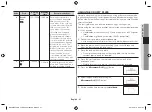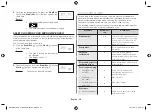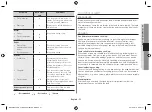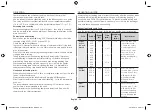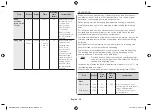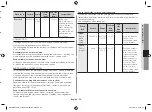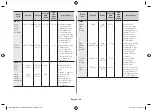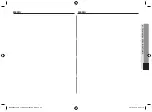
English - 54
English - 55
REHEATING
Your microwave oven will reheat food in a fraction of the time that
conventional ovens hobs normally take.
Use the power levels and reheating times in the following chart as a guide.
The times in the chart consider liquids with a room temperature of about
+18 to +20 °C or a chilled food with a temperature of about +5 to +7 °C.
Arranging and covering
Avoid reheating large items such as joint of meat - they tend to overcook
and dry out before the centre is piping hot. Reheating small pieces will be
more successful.
Power levels and stirring
Some foods can be reheated using 900 W power while others should be
reheated using 600 W, 450 W or even 300 W.
Check the tables for guidance.
In general, it is better to reheat food using a lower power level, if the food
is delicate, in large quantities, or if it is likely to heat up very quickly (mince
pies, for example).
Stir well or turn food over during reheating for best results. When possible,
stir again before serving.
Take particular care when heating liquids and baby foods. To prevent
eruptive boiling of liquids and possible scalding, stir before, during and
after heating. Keep them in the microwave oven during standing time.
We recommend putting a plastic spoon or glass stick into the liquids.
Avoid overheating (and therefore spoiling) the food. It is preferable to
underestimate cooking time and add extra heating time, if necessary.
Heating and standing times
When reheating food for the first time, it is helpful to make a note of the time
taken - for future reference.
Always make sure that the reheated food is piping hot throughout.
Allow food to stand for a short time after reheating - to let the temperature
even out.
The recommended standing time after reheating is 2-4 minutes, unless
another time is recommended in the chart.
Take particular care when heating liquids and baby food. See also the
chapter with the safety precautions.
REHEATING LIQUIDS
Always allow a standing time of at least 20 seconds after the oven has been
switched off to allow the temperature to even out. Stir during heating, if
necessary, and ALWAYS stir after heating. To prevent eruptive boiling and
possible scalding, you should put a spoon or glass stick into the beverages
and stir before, during and after heating.
Reheating Liquids and Food
Use the power levels and times in this table as a guide lines for reheating.
food
portion power
(W)
Time
(min.)
standing
time
(min.)
instructions
Drinks
(coffee,
tea and
water)
150
ml (1
cup)
900
1-1½
1-2
Pour into cups and
reheat uncovered:
1 cup in the centre,
2 cups opposite of
each other, 3 cups
in a circle. Keep in
microwave oven
during standing time
and stir well.
300
ml (2
cups)
2-2½
450
ml (3
cups)
3-3½
600
ml (4
cups)
3½-4
Soup
(chilled)
250 g
350 g
450 g
550 g
900
2½-3
3-3½
3½-4
4½-5
2-3
Pour into a deep
ceramic plate or deep
ceramic bowl. Cover
with plastic lid. Stir
well after reheating.
Stir again before
serving.
Stew
(chilled)
350 g
600
4½-5½
2-3
Put stew in a deep
ceramic plate. Cover
with plastic lid. Stir
occasionally during
reheating and again
before standing and
serving.
food
portion power
(W)
Time
(min.)
standing
time
(min.)
instructions
Pasta
with
sauce
(chilled)
350 g
600
3½-4½
3
Put pasta (e.g.
spaghetti or egg
noodles) on a flat
ceramic plate. Cover
with microwave
cling film. Stir before
serving.
Filled
pasta with
sauce
(chilled)
350 g
600
4-5
3
Put filled pasta (e.g.
ravioli, tortellini) in a
deep ceramic plate.
Cover with plastic
lid. Stir occasionally
during reheating and
again before standing
and serving.
Plated
meal
(chilled)
350 g
450 g
550 g
600
4½-5½
5½-6½
6½-7½
3
Plate a meal of 2-3
chilled components
on a ceramic dish.
Cover with microwave
cling-film.
Cheese
fondue
ready-
to-serve
(chilled)
400 g
600
6-7
1-2
Put the ready-to-serve
cheese fondue in a
suitable sized glass
pyrex bowl with lid.
Stir occasionally
during and after
reheating. Stir well
before serving.
MC285TCTCSQ_TL_DE68-04126J-02_EN.indd 54
2014-05-16 �� 6:01:11


